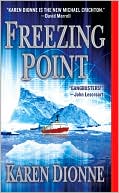These days, it's difficult to identify with anyone from Wall Street. But I hope you'll care about Grove, a decent if somewhat irreverent guy who could be any one of us. He works hard and keeps his head down. He's trying to hold it together as he chases the dream. Only Grove has no clue, he has no idea what's lurking round the bend.
 Top Producer begins inside a raucous party of 500 people, where Grove watches the spectacular death of Charlie Kelemen—best friend and money manager with the Midas touch and spending habits to match. After the funeral, Charlie's widow confides to Grove she can't find her husband's money and has only $600 left in a checking account. Grove offers to help, but the more he looks for her fortune the more trouble he finds. With the police. With his colleagues. With some really bad guys.
Top Producer begins inside a raucous party of 500 people, where Grove watches the spectacular death of Charlie Kelemen—best friend and money manager with the Midas touch and spending habits to match. After the funeral, Charlie's widow confides to Grove she can't find her husband's money and has only $600 left in a checking account. Grove offers to help, but the more he looks for her fortune the more trouble he finds. With the police. With his colleagues. With some really bad guys.I've seen plenty during my years on Wall Street—big money, snap decisions that worked and some that went way bad. I've worked side by side with people who belong deep inside the pages of fiction for their quirks, scary-smart intelligence, or relentless drive to grow rich. I know the rush of trading first hand and understand how it feels to buy and sell one hundred million dollars of stock in one day.
As an author, I wove much that is real into the story. Financial risk, trading errors, and cutthroat competition—the day-to-day stress of stockbrokers is all there. The dialogue and jargon are real. I know because Grove O'Rourke borrowed one of his best lines from me.
"My job is to bring you the best of Wall Street. And protect you from it at the same time."
Inside Top Producer you'll find financial advisers who are obsessive, almost maniacal in their insistence on secrecy. It's real. People swap firms all the time on Wall Street, which means stockbrokers never discuss clients by name. Never. Today's colleagues are tomorrow's competitors.
I remember well, from my days as a stockbroker, the tension of open-plan seating in an occupation that prizes confidentiality. No secret was safe among the rows and rows of low-rise cubicles. To protect the identity of our clients, in a room full of ears, my team used aliases. We actually named our clients after super heroes.
So when John called from Malibu, my sales assistant would stand up and holler across the desk, "Norb, Batman is on the phone."
Or when Nikki called from St. Barth, the message was, "Wonder Woman on line two, Norb."
We had Green Lantern and Flash. At times when the phones lit up, it sounded like the Justice League of America was asking for our financial advice. Unfortunately, all good things come to an end. Our system broke down when we told clients their superhero identities. The problem was simple.
Everyone wants to be Superman.
My observations from a career in finance—some shocking and some humorous—find their way into the fiction of Top Producer. You'll encounter procreative fruit flies, an eighteen-foot inflatable rat, and other anecdotes from the intriguing edges of Wall Street. You'll also find the dark side, the cons and the frauds, which unfortunately are all too real.
Although Top Producer is a novel, it may change the way you think about financial services—as it did for me. My fact and fiction collided the evening of December 11, 2008.
I was walking down Fifth Avenue to a client's Christmas party. It was pouring that night, and my shoes felt like colanders. In my left hand, I held a king-sized umbrella. It was losing a one-sided battle to gusting wind and driving rain.
With my right hand, I was hitting a BlackBerry's refresh button for articles from The Wall Street Journal. Every time I "refreshed," new stories popped up. After a day away from the desk, I was catching up on financial news before wandering into a party filled with clients and financiers.
One story jumped out. One story made me forget the inclement weather and soggy pedestrians. One story took my breath away. I stepped out of the rain into the doorway of an office building. I first called my agent, Scott Hoffman of Folio Literary Management. And then I called my editor, Pete Wolverton of Thomas Dunne Books. I left the same message for each.
"We need to talk. My novel just came true."
The Bernard Madoff story broke on the afternoon of December 11, 2008. His confession roiled the capital markets as details of a $65 billion fraud came to light. It opened the floodgates to news of other Ponzi schemes, outright frauds, and tax evasion.
No one was more surprised than me. Top Producer is a novel about financial corruption. But I sold the story to St. Martin's Press in 2007 and had finished 99 percent of the edits before December 11, 2008. I do not know Bernard Madoff and never contemplated him as I wrote.
At its core, my novel is about friendship, betrayal, and ultimately redemption. I personally enjoy stories about underdogs, about everyday people who solve problems under the duress of overwhelming odds and bleak consequences—no matter the backdrop, Wall Street or otherwise.
Happy reading.
Norb Vonnegut
 Top Producer is a Today Show Top Fall Pick!
Top Producer is a Today Show Top Fall Pick!



